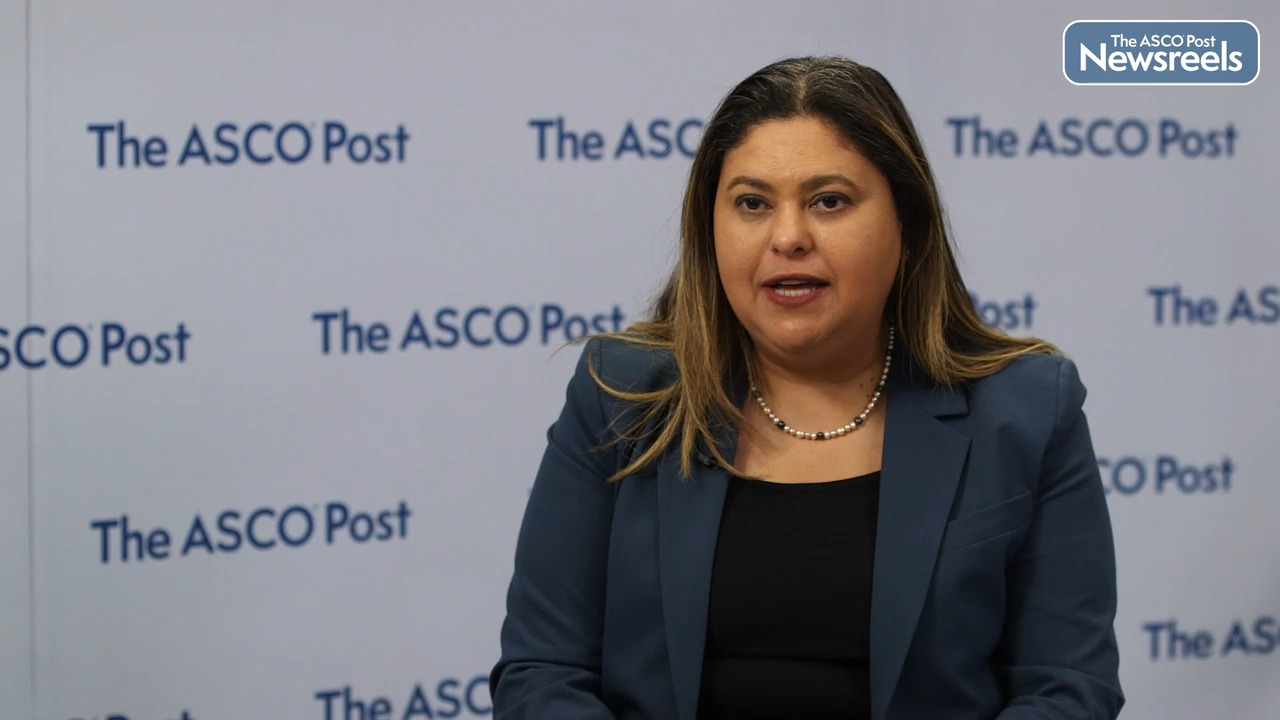Arlene O. Siefker-Radtke, MD, on Metastatic Urothelial Carcinoma: New Data on Erdafitinib vs Chemotherapy From the THOR Study
2023 ASCO Annual Meeting
Arlene O. Siefker-Radtke, MD, of The University of Texas MD Anderson Cancer Center, discusses phase III findings showing that for patients with advanced or metastatic urothelial carcinoma and FGFR alteration who already had been treated with a PD-(L)1 inhibitor, erdafitinib significantly improved overall and progression-free survival, as well as overall response rate, compared with investigator’s choice of chemotherapy (LBA4619).
Transcript
Disclaimer: This video transcript has not been proofread or edited and may contain errors.
Arlene O. Siefker-Radtke:
We now have results from the THOR clinical trial studying erdafitinib in patients who have metastatic surgically unresectable urothelial carcinoma, who've received prior therapy for their tumor. This is the first clinical trial, showing proof of concept benefit from FGF targeted therapy, compared to what's been observed with chemotherapy.
The design of the trial takes patients who've had prior treatment, typically chemotherapy with platinum or carboplatinum, and patients may have had an immune checkpoint inhibitor. There are two cohorts to this trial. The cohort being presented is the group of patients who've had a prior immune checkpoint inhibitor. Patients were randomized between either erdafitinib alone or single agent taxane, or vinflunine, which is approved in Europe. And the results of the trial looked quite good indeed, with it hitting on all three endpoints.
The primary endpoint of the trial was median overall survival, and erdafitinib came in with a statistically significant improvement in overall survival with a median overall survival of 12 months compared to single agent chemotherapy, which was around 7.8 months. We also saw evidence of benefit in progression-free survival and overall survival. The progression-free survival with erdafitinib was around five and a half months. Single agent chemotherapy was half that amount, and the objective response rate for erdafitinib was around 45%, so that's 45% PRs and CRs, while single agent chemotherapy had a response rate of around 11%.
The toxicity reported is similar to what has been observed with other clinical trials of FGF targeted therapy, and as a result of this work, erdafitinib is here to stay as part of the standard armamentarium for the treatment of our urothelial cancer patients.
Related Videos
The ASCO Post Staff
Tycel J. Phillips, MD, and Alex F. Herrera, MD, both of the City of Hope National Medical Center, discuss results from the SWOG S1826 study, which showed that nivolumab and AVD (doxorubicin, vinblastine, and dacarbazine) improved progression-free survival vs brentuximab vedotin plus AVD in patients with advanced-stage classical Hodgkin lymphoma. Longer follow-up is needed to assess overall survival and patient-reported outcomes. This trial may be a key step toward harmonizing the pediatric and adult treatment of advanced-stage disease (LBA4).
The ASCO Post Staff
Cathy Eng, MD, of Vanderbilt-Ingram Cancer Center, and Lars Henrik Jensen, MD, PhD, of the Danish Colorectal Cancer Center South and the University Hospital of Southern Denmark, discuss phase III results from the Scandinavian NeoCol trial, which showed that neoadjuvant chemotherapy is not superior to standard upfront surgery in terms of disease-free and overall survival in patients with colon cancer, although there are certain circumstances when this approach may have more favorable outcomes (Abstract LBA3503).
The ASCO Post Staff
Nagla Abdel Karim, MD, of the Inova Schar Cancer Institute, University of Virginia, discusses phase II data showing that maintenance atezolizumab plus talazoparib improved progression-free survival in Schlafen-11–selected patients with extensive-stage small cell lung cancer. This study demonstrated the feasibility of conducting biomarker-selected trials in this disease, paving the way for future evaluation of novel therapies in selected populations (Abstract 8504).
The ASCO Post Staff
Alicia K. Morgans, MD, MPH, of Dana-Farber Cancer Institute, and Karim Fizazi, MD, of Institut Gustave Roussy, University of Paris-Saclay, discuss findings from the TALAPRO-2 study, which showed that talazoparib plus enzalutamide improved radiographic progression–free survival over standard-of-care enzalutamide as first-line treatment for patients with metastatic castration-resistant prostate cancer and HRR gene alterations. This regimen also delayed the time to deterioration in global health status and quality of life (Abstract 5004).
The ASCO Post Staff
Eunice S. Wang, MD, of Roswell Park Comprehensive Cancer Center, and Gregory Roloff, MD, of the University of Chicago, discuss data that are the first to demonstrate post–FDA approval efficacy and toxicity rates of brexucabtagene autoleucel in adults with relapsed or refractory B-cell acute lymphoblastic leukemia. Although the data may confirm high response rates associated with this agent, they also highlight the need for interventions to reduce associated toxicities (Abstract 7001).





